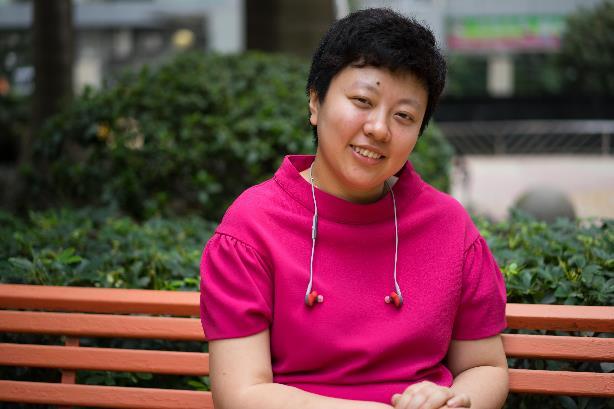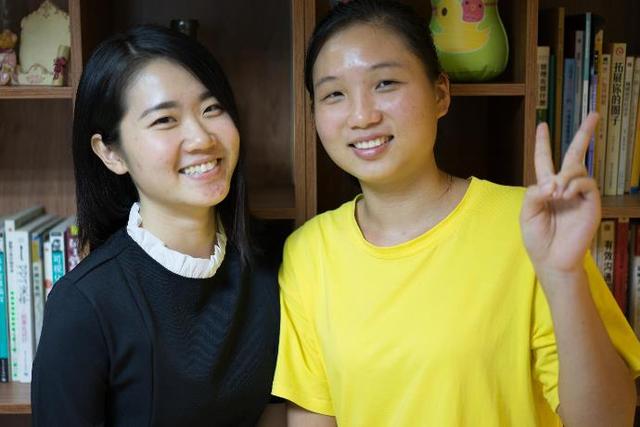“It’s about survival. It’s about respect.” – preventing HIV in China
2015-12-01
© UNICEF EAPRO/2015/Simon Nazer
Xiao Tian, 19, holding his phone with the Lingnan Partner mobile app, where people can access a host of HIV-related support and services.
by Simon Nazer, Communication Consultant, UNICEF East Asia and Pacific
In the centre of Guangzhou, a sprawling industrial city of 12 million in Southern China, dedicated staff in a small clinic are working to protect some of the most vulnerable from HIV.
Xiao Tian*, 19, started working at the Lingnan Partner clinic after using the services himself, and already knows this is the place for him. “It can be very difficult to work here sometimes,” he says. “I’ve seen 12 positive tests in the last two months. It’s hard, but I do this because I really want to help people. I think this is my place.”
Guangzhou is one of the hardest hit cities by HIV in China, and adolescents are particularly at risk. Infection rates among students have reportedly nearly doubled since 2002. Similar trends can be seen throughout many parts of Asia-Pacific. According to a new report, the region is facing a ‘hidden epidemic’ of HIV among adolescents.
The report, ‘Adolescents under the Radar’, shows that although new HIV infections are falling overall, they are rising among at-risk adolescents. Regionally, there were an estimated 50,000 new HIV infections among adolescents aged 15-19 in 2014 alone.
In Guangzhou, a city with a population the size of Portugal, reaching the most vulnerable can be difficult. Coupled with the fact that stigma and fear around HIV continues to thrive, it’s a big challenge for health workers to reach those most at risk.
As part of the national HIV prevention and control strategy, the Government of China is supporting community-based organisations to help those in need and prevent HIV. That’s why UNICEF is now working with community organisations like Lingnan Parner to encourage young people to access government-provided testing and treatment services, in a non-intimidating and adolescent friendly way.
As an adolescent himself, Xiao Tian knows the risks only too well. “So many teenagers don’t know about safe sex when they first have sex - we make sure we teach them. We empower adolescent groups to talk and ask questions, to learn about safe sex. We provide a safe space so they are never afraid to talk or ask for help.”
Xiao Tian then turns to his smart phone, scrolling through some applications. “Phone apps and social networks are being used by many men to find hook-ups, which can be risky,” he says. “We are engaging with these networks to spread information about HIV and our services.”
As well as engaging with existing networks, Lingnan has its own mobile application. Xiao Tian opens the application and shows how people can get information on HIV and safe sex, access forums, book appointments for testing and counselling, and even order home testing kits for a small fee.
Life support for adolescents

© UNICEF EAPRO/2015/Simon Nazer Li Xiaomi, who runs the clinic, works with adolescents to both support them and help them becomes advocates for change.
31 year old Li Xiaomi* runs the clinic and has been working there for 13 years. She says that working to prevent HIV is about more than just testing. “Many people have no idea what they’re getting into,” she says. “I want to fill this information gap so that people can make informed decisions.”
Like in many countries, the lack of information can lead to devastating outcomes, she says. “People with HIV face the risk of losing their jobs, their friends and family. They can also lose their dignity and rights. That’s very unfair,” she says.
“We need to educate people better about HIV and the risks and ensure the correct information is out there – there is so much misinformation.”
Both Li Xiaomi and Xiao Tian have experienced the stigma and discrimination associated with HIV themselves. “For the last 13 years I haven’t been using my real name,” says Li Xiaomi. “Some of my friends know what I do but think it’s not right.”
Her work has also caused deep divisions with her parents. “My dad accepted it but my mother couldn’t – she refused to accept me as her daughter because of it. I’m not even living with HIV…” she shakes her head.
While adolescent groups are among those most at risk of HIV, they also offer an opportunity to affect change, Xiaomi added, herself a graduate in economics and finance. “It’s generally more effective to target adolescent groups than adults. They are still building their life skills, and they can learn the skills that will benefit them and their peers for a life time.”
Peer to peer student counsellingLingnan Partner is also training university students to become peer-to-peer educators to engage large numbers of young people to learn about safe sex, and refer teenagers to health services when needed. One such group is the Guangdong Youth Network (WeChat:GDYNforyou).
21-year-old social work student Yao Zhi Lu has hit many barriers but her enthusiasm to promote sex education remains undimmed. “Many students aren’t willing to discuss sex at first. If I want to talk to people about it they all run… even my roommate didn’t want to admit she knows me,” she says, smiling.
Yao Zhi Lu believes the younger generation has a big responsibility to increase understanding and make changes. “I can’t tell my parents I do this, they wouldn’t like it. The older generation doesn’t really understand we’re actually teaching people about protection.”
Lectures, videos, events, even ‘hugathons’, are all ways they are reaching out to young people with potentially life-saving information.

© UNICEF EAPRO/2015/Simon Nazer Yao Zhi and Xu Li Hui, both pictured, are peer-to-peer educators, sharing sex education information among fellow university students.
“Sex education is not just about having sex,” says Xu Li Hui, another student and peer-to-peer educator. “It’s about survival. It’s about respect. We’re reaching 1000s of students with this message.”
But young people like medical student and educator Tao Ming Li are making a difference. “After 3 years, we were able to reach around 15,000 students. In the end, we got our school to integrate sex education in the curriculum.”
As the work of staff and volunteers at Lingnan Partner shows, testing is only part of the effort to help prevent HIV. People, particularly vulnerable groups such as adolescents, need a safe space to get together and share information. These spaces can be on- or offline and give young people a place to talk privately and receive trusted advice, without fear of shame or discrimination.
“We help people not only to solve their own issues but help build their capacity to help others,” says Li Xiaomi, as she looks through her packed calendar for the day. “The information, the understanding… that’s where change can happen.”
* Names have been changed









